Donovan's “Catch The Wind”
| Pop and Misc. Notes |
Donovan's “Catch The Wind”
Donovan is often described as a hippie, lightweight Dylan, a kind of Dylan Lite. And there’s no denying the resemblance. But who wasn’t trying to sound like Dylan in the sixties? And unlike many of the imitators, Donovan actually had songwriting and musical chops to back up his imitation. Take “Catch the Wind,” a pretty little song that sounds like a “Freewheelin’” Bob Dylan castoff but is sweeter than anything Dylan has ever done. At its worst, this sweetness made Donovan sound like a sprite or naive schoolboy, but on songs like this, it was utterly charming.
Catch The Wind
It took Great Britain a little longer than America to embrace Bob Dylan, with the singer/songwriter's second album, “The Freewheelin'” Bob Dylan, not marking his chart debut there until May 1964, a year after its release. With that, however, Dylan became enormously popular, with his next albums “The Times They Are A-Changin'” and “Another Side of Bob Dylan” scoring higher than they did at home. By early 1965, Dylan had begun to record with electric instruments, but in England he was still viewed as a folksinger with an acoustic guitar hanging from his shoulders and a harmonica rack set before his mouth. Just then, a homegrown version of the same thing appeared: 18-year-old Donovan Leitch. There is little doubt that Donovan's resemblance to Dylan is what got him a pair of managers and a shot on the British TV show ‘Ready Steady Go!’ on February 6, 1965, with return engagements the following two weeks.
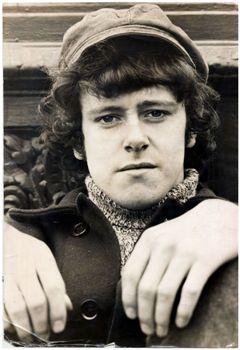
Donovan, 1965
Donovan Leitch started appearing on the folk scene in the mid 1960s. In fact, he performed at the famous 1965 Newport Folk Festival at which Bob Dylan went electric. He followed with a series of hits, including “Hurdy Gurdy Man,” “Sunshine Superman,” “Jennifer Juniper,” and numerous others. Many, including John Lennon, looked upon Donovan as a significant influence with his combination of melodic pop sensibility and lyrics that were a kind of epitome of the flower-child ethos of the Sixties.
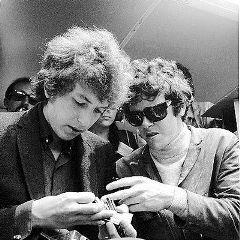
Dylan & Donovan, Newport 1965
Recorded in 1964 and released the following year in both the United States and United Kingdom, "Catch The Wind" was Donovan's debut single. It was released as a single in the United Kingdom on March 12, 1965 through Pye Records and a few months later in the United States through Hickory Records. The single was backed with "Why Do You Treat Me Like You Do?" on both the United Kingdom and United States releases. The melody of the song was influenced by "Chimes of Freedom" by Bob Dylan.
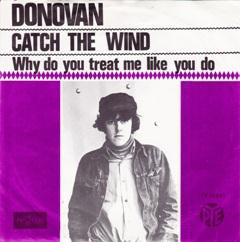
Catch the Wind, single, Pye Records 1965
Employing a similar title to Dylan's "Blowin' in the Wind," "Catch the Wind" was also a ballad played on acoustic guitar with harmonica fills, sung in a similarly husky, if somewhat more regular voice than Dylan's. The main difference was that while Dylan rarely sang directly of romantic love (at least, he rarely did so approvingly), "Catch the Wind" was an unabashed love song in which a young man, in highly poetic language, his desire for a woman before wistfully adding, "Ah, but I may as well try and catch the wind."
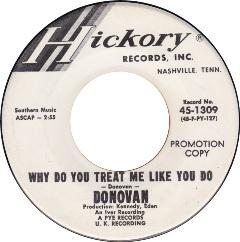
Catch the Wind, single, Hickory Records 1965
In an interview with Dierdre O'Donoghue on KCRW Radio, Los Angeles, Donovan said: "'Catch The Wind,' I wrote it for Linda (Lawrence, who he married in 1970), although I hadn't really met her yet. It is a song of unrequited love, yet I hadn't really met her, so how could I miss her? And I seem to write prophetic songs in the sense of the Celtic poet and I wrote this song before I met Linda, of a love I would like to have had and lost." The lyrical sentiment reflected a legitimate naivety, as an 18-year-old Donovan sang wistful lines including “When sundown pales the sky / I wanna hide a while / Behind your smile / And everywhere I'd look, your eyes I'd find.” That unaffected, unadorned innocence was echoed in a dulcet folk melody matched to Donovan's acoustic guitar chording and harmonica riffs. The single version featured Donovan's vocals with echo and a string section.
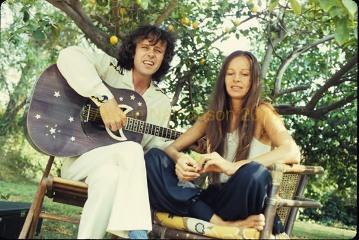
Donovan & Linda Lawrence
The melody of “Catch the Wind” sounds ageless, and Donovan uses this characteristic to play to the lyrics’ age-old theme of unrequited (or is it just impossible?) love. His vocal performance teeters on the edge of tweeness, but that catch in his voice when he says “would be the sweetest thing” is, against all odds, perfect.
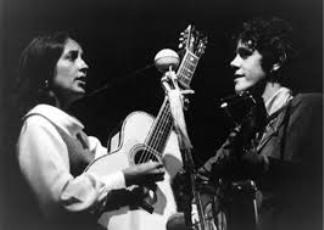
Joan Baez & Donovan, Newport 1965
From his early troubadour songs of 1965, Donovan quickly developed into key figure in the development of music of the period. Embracing music from other cultures, composing collections of songs for children, and working with The Beatles, he defined what we now refer to as both psychedelia and acid folk. For a short period in the mid-Sixties, Donovan was seen as Britain’s answer to Bob Dylan. History, however, has not been kind. By the Eighties he was dismissed as a psychedelic novelty, a hippy-dippy troubadour who clung to Eastern mysticism while all around him the pioneers of New Wave presented a political urgency.
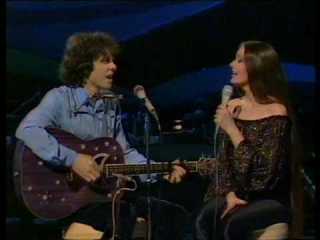
Donovan & Crystal Gale sing Catch The Wind
"Catch the Wind" hit the British charts in March 1965 and peaked in the Top Five (No.4). In May, it figured in the American charts, peaking in the Top 40 by July (No.23). Though it remains identified with its author, the song has earned a respectable number of covers over the years.
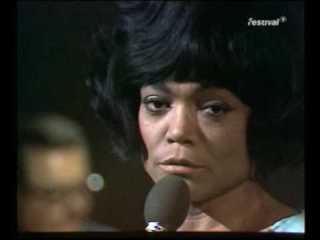
Eartha Kitt sings Catch The Wind
Donovan - Catch The Wind
In the chilly hours and minutes, Of uncertainty, I want to be, In the warm hold of your loving mind. To feel you all around me, And to take your hand, along the sand, Ah, but I may as well try and catch the wind. When sundown pales the sky, I wanna hide a while, behind your smile, And everywhere I'd look, your eyes I'd find. For me to love you now, Would be the sweetest thing, 'twould make me sing, Ah, but I may as well, try and catch the wind. When rain has hung the leaves with tears, I want you near, to kill my fears To help me to leave all my blues behind. For standin' in your heart, Is where I want to be, and I long to be, Ah, but I may as well, try and catch the wind.
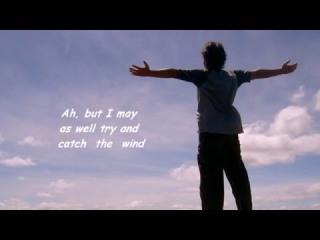
Catch the wind








